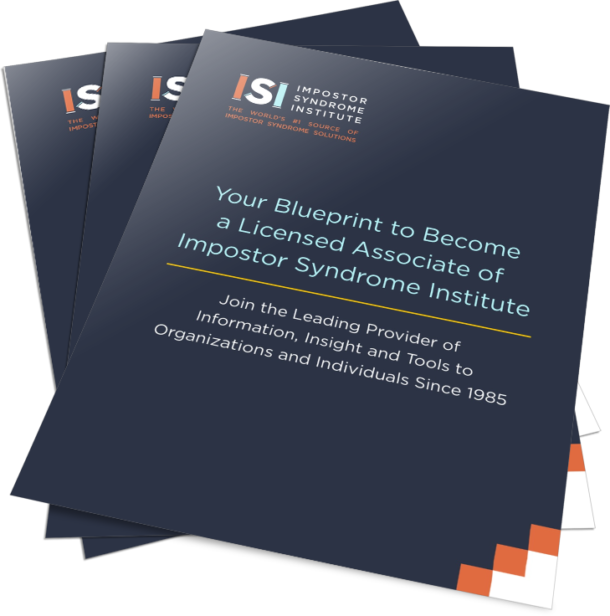Adelle was convinced that she’d fooled everyone into thinking she was smarter and more capable than Adelle “knew” herself to be.
“I suffer with impostor syndrome on a minute-to-minute basis,” she wrote.
She’d recently graduated with honors from an elite women’s college. She was also the first in her working-class family to go beyond high school.

Instead of applying for corporate jobs or law school like her classmates, Adelle decided to use her business degree as a self-employed social media manager in the trucking industry, something she knew about from her dad’s work driving long-haul trucks.
When I read Adelle’s email my first thought was, how could she not feel like a fraud?
After all, she checks the boxes for multiple groups known to be prone to impostor syndrome.
√ Her impostor feelings took hold while a college student.
√ She spent four years striving in an elite and, therefore, highly competitive school environment.
√ She was a first-generation student and now, first generation not to work in a so-called blue-collar job.
√ She works alone.
√ She works in an industry with historically few women.
Rather than take comfort in this information, Adelle’s response was, “Oh no, I’m doomed!”
Considering how impostor syndrome has been largely framed, this response was not surprising.
Impostor Syndrome Has Been Over-Personalized

Early efforts to address impostor syndrome focused entirely on therapy.
Even now, it’s most often talked about in purely individual terms.
As a consequence, we think the solution is to fix ourselves.
But what if you knew that there are perfectly good reasons why Adelle, or anyone, might feel less capable and intelligent than they really are?
In other words, what if we “normalized” impostor syndrome?
Not by making the dismissive case that it’s no big deal because “everyone has it” (they don’t).
And not by insisting that impostor syndrome is healthy (it’s not).
But by understanding that under certain conditions, it would be more surprising if you didn’t feel like an impostor.
In Adelle’s case there are situational and societal factors at play.
Given Adelle’s impostor feelings began in college, let’s start there.
UNDERSTAND Situational Sources of Impostor Syndrome
As a segment of the population, college students are far more likely to experience impostor syndrome.
Why wouldn’t they?
As a student, your knowledge and intellect are literally being tested and graded every single day.
Another situational factor has to do with the added challenge of achieving in a highly competitive environment.
In the last few years. I’ve been contacted by an increasing number of high school students grappling with impostor syndrome.
In every case, they attend presumably more competitive private schools.
I’ve delivered hundreds of webinars on Rethinking Impostor Syndrome™. The one group I can predictively expect will not unmute themselves and share publicly are associates at large global law firms.
You might infer from this that attorneys tend toward introversion.
Or you could interpret, as I have, that working in a highly competitive environment not only makes the public admission of impostor feelings professionally risky but it may itself contribute to impostor syndrome.

In addition to being a student and being in a highly competitive environment, a third situational context for impostor syndrome is the experience of working alone.
Unlike employees, people who are self-employed or solo practitioners do not get regular performance reviews.
Left on their own, they are apt to be more critical of their performance.
Plus with no one to bounce ideas off or problem-solve with, no one to turn to for advice or perspective, the pressure to succeed is all on you.
There’s anecdotal evidence that the huge increase in people working remotely due to COVID resulted in a pandemic of impostor feelings.
Suddenly, there’s no informal “meeting after the meeting” to process things; it’s harder to read body language on a virtual platform, and you worry everyone is working harder and longer than you.
Understand Societal Sources of Impostor Syndrome
Another group susceptible to impostor syndrome are those who, like Adelle, are the first generation in their family to go to college, to have a white-collar job, or in some cases, to achieve wealth.
Understandably, “first gens,” as they are known, can feel like outsiders.
The US Supreme Court Justice Sonia Sotomayor grew up in a financially disadvantaged community in the Bronx and was the first person in her family to go to college.

After graduating first in her high school class she was accepted into Princeton University.
When she walked through the ivy-covered campus gates, Sotomayor said she felt like “a visitor landing in an alien country.” She kept waiting for someone to tap her on the shoulder and say, “You don’t belong here.”
For the entire first year, she said was too intimidated to ask questions in class.
Or maybe, like Adelle, you’re working in a field or a workplace where there have traditionally been few women.
When we’re one of only a few or perhaps the only woman, person of color, person with a disability, or member of any group subject to stereotypes about competence and intelligence, you’re more apt to experience impostor syndrome.
This applies too if you are in the unique position of being the first person from your group in a particular role or at a high level.
After all, when you are one of a few, or the only, or the first – then on top of the normal job pressures everyone else has – you also have the additional societal pressure to represent your entire group.

Like the young woman who was blind and about to take her first job out of college.
She feared that if she wasn’t, in her words, “Super Blind Person” then the next time someone with a sight impairment applied for a job, they’d be reluctant to hire them.
Personalize Less and Contextualize More
Seeing how your internal experience may, in part, be an understandable response to external factors serves two purposes.
First, contextualizing can reduce the initial pressure to resolve what is often viewed entirely as a personal problem.
For example, medical education has been characterized as a culture of shaming.
When medical students and residents are helped to see that while this may not be the culture they thought they were signing up for, it is however, the culture they are in, they can contextualize their impostor feelings more and personalize them less.
Second, normalizing impostor syndrome flips both the individual and collective narrative from “Why do I feel like an impostor?” to “How could I not?”
(It’s a case I laid out in detail in Unpacking Michelle Obama’s Impostor Syndrome.)

For individuals in marginalized groups, contextualizing impostor syndrome also helps interrupt the false belief that if they were truly competent, they would not be unnerved being, the only Indigenous employee, one of a few female analysts, or the first blind division head.
Coaches, therapists, educators, and managers alike need to explicitly convey the message that you can be perfectly competent and still experience normal stress in these situations.
The Bottom Line
Finding out you’re in a group that’s likely to doubt their competence should not be cause for alarm.
On the contrary, it benefits Adelle — and anyone with impostor syndrome — to understand external sources over which we have little or no control.
So next time you have what you now know is a normal impostor moment, stop and hit the pause button.
Then zoom out to get the view from 10,000 feet — or if you prefer, from 3,000 kilometers 🙂
Then remind yourself, ”Of course, I feel like an impostor. Considering the source, how could I not?”




